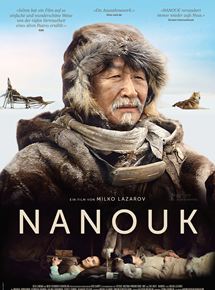![]()
Bulgaria| Germany | France 2018
Opening October 18, 2018
Directed by: Milko Lazarov
Writing credits: Simeon Ventsislavov, Milko Lazarov
Principle actors: Mikhail Aprosimov, Feodosia Ivanova, Sergei Egorov, Galina Tikhonova
 Nanouk (Mikhail Aprosimov) and his wife Sedna (Feodosia Ivanova) are reindeer farmers in the northern Arctic. Their days are mostly comprised of solitary tasks, like long trips across the frozen wastes to fish and check traps. Their home is traditional Arctic yurt made of fur, and while it can be unstable in storms, it provides what they need. They are both getting older though; Nanouk is becoming more forgetful and Sedna has a wound on her side which is only getting worse by the day no matter how much she treats it with homemade ointment. Knowing she likely doesn’t have much time left, Sedna wishes to talk with her daughter Ága (Galina Tikhonova) once again. Nanouk won’t hear of it. Ága left in disgrace several years before, and now works far away for a diamond mine. Still, Sedna dreams of seeing her daughter once again and Nanouk must face that their time might be short.
Nanouk (Mikhail Aprosimov) and his wife Sedna (Feodosia Ivanova) are reindeer farmers in the northern Arctic. Their days are mostly comprised of solitary tasks, like long trips across the frozen wastes to fish and check traps. Their home is traditional Arctic yurt made of fur, and while it can be unstable in storms, it provides what they need. They are both getting older though; Nanouk is becoming more forgetful and Sedna has a wound on her side which is only getting worse by the day no matter how much she treats it with homemade ointment. Knowing she likely doesn’t have much time left, Sedna wishes to talk with her daughter Ága (Galina Tikhonova) once again. Nanouk won’t hear of it. Ága left in disgrace several years before, and now works far away for a diamond mine. Still, Sedna dreams of seeing her daughter once again and Nanouk must face that their time might be short.
With its slow pace and beautiful visuals, Nanouk gives a stark vision of the Arctic landscape and the strength it takes to grow old in such a terrain. Visually stunning, Milko Lazarov and his crew highlighted the magnificence and dramatic quality of the Arctic tundra. The cinematography is impressive and is one of the true highlights of the film. Amongst this backdrop, Nanouk and Sedna go about their daily routines. Their lives are simple and difficult and reflect on how traditional lifestyles are dying out in modern times. There is no longer a community to support them in their old age, the reindeers have long stopped making their way through the area, and everyone has left to make their way in more stable and profitable locations. Yet Nanouk and Sedna remain, and the audience must watch them with their daily struggles and joys and wonder how long it can continue to last. Nanouk is a tragic testament to the strength of traditional lifestyles in the face of the pressures of encroaching modernity and ecological changes. (Rose F.)
